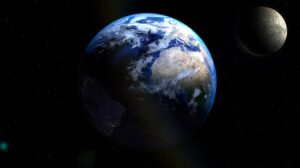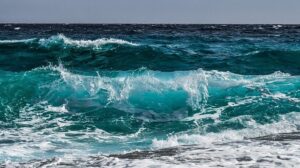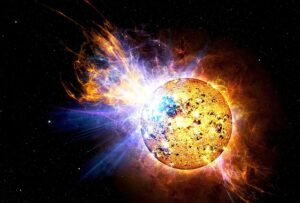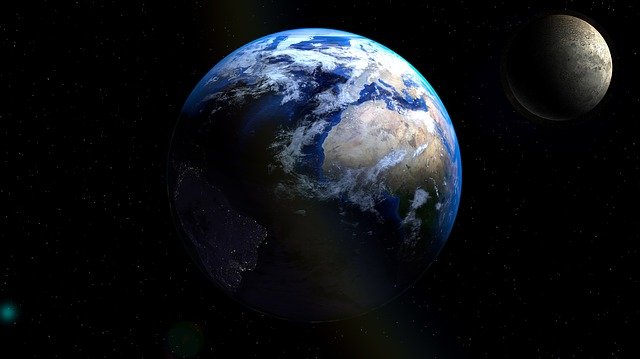
Have you ever wondered what would happen if the planet’s rotation came to a halt? You probably anticipate it will not result in anything positive.
Most people on Earth would perish if the planet halted abruptly. Slowing down gradually, though, is absolutely devastating, nevertheless, there is a chance that some individuals might survive.
Here is how things would turn out!
If Earth Suddenly Stopped Spinning
The Earth’s rotation rate is approximately one thousand miles per hour at the equator, decreasing with increasing northern or southern distance from the equator. At the north and south poles, the rotation is effectively zero.
If the planet suddenly stopped spinning, the air would continue to flow at 1050 mph and anything not fastened to the ground would be carried off the surface of Earth.
This includes boulders, trees, buildings, people, and everything flung sideways at a speed of 1050 mph (at the equator). Could you imagine what would happen if water was pushed that fast?
It would literally strip the Earth’s surface down to the core.
The consequences are even worse if we take into account that Earth’s magnetic field is presently declining.
It means that solar radiation will penetrate the planet resulting in a massive explosion of life on the planet and affecting its atmosphere in many ways.
So, in my opinion, if anything would happen to the Earth, it would be better if its rotation came to a halt. It would reduce radiation and hit the planet with less debris, but people on the equator will die.
Earth’s Spinning Stopped Gradually
You may believe that, if the Earth’s spin gradually stops, we won’t be launched about like rag dolls and everything will be fine. Wrong! It would be a catastrophe.
Although, the air would flow to the center of the planet and it will lose tremendous momentum, throwing us toward the North and South Poles.
This is because Earth’s angular momentum must remain unchanged. Therefore, if Earth stops spinning rapidly, there would be a net transfer of angular momentum from Earth to the Moon (because it orbits closer to the poles).
The Moon would gradually gain angular momentum and increase its distance from Earth.
If Earth’s rotation stopped gradually, it is estimated that the Moon would reach a maximum distance of around 5 times the present value within about 3.5 billion years.
That means that by then, our night sky will be filled with several moons! The largest one (Moon X) will be very close to Earth. It would shine with a magnitude of -18.7 brighter than the Full Moon does today, which is bright enough to read by at night!
What happened to the oceans

The Earth is not a sphere, it has a bulbous shape because of its spinning motion, resulting in an equatorial bulge (Earth’s size around the equator is 26 miles greater than that from pole to pole).
If the Earth’s spin gradually quickened, the rising water from the seas would move away from the equator and towards the poles.
The equator is currently 25,000 miles long and would then increase to 42,000 miles as the Earth’s spin quickened.
Seashells or any remains of marine life that now lie on coastlines would eventually be found thousands of miles from the sea as the planet rotated twice as fast as it does today.
The oceans are slowly evaporating, too.
Scientists believe that the amount of water in our oceans has not changed significantly since it first formed four billion years ago, but somehow Earth’s rotation should have increased by now if it had always spun as fast as it does today.
The changing patterns on Earth will produce horrific storms, just like those which hit Haiti recently, with winds reaching 1050 mph.
What happened to the atmosphere
The atmosphere rotates with the Earth, but because the rotation of Earth is slowing down, it is now beginning to follow the flow of seas toward the poles.
Air would be thicker at the poles and thinner at the equator as a result of this circulation.
Only four regions in the mid-latitudes would be suitable for human habitation.
Geological Disturbances
The Earth has three distinct layers: the core, the mantle, and the crust.
Because each layer is composed of a different substance, as the planet’s rotation slows, each layer will slow at a different rate, resulting in considerable friction between them.
This friction would cause earthquakes that had never occurred before and increase volcanic activity, especially on the ocean floor when the planet’s rotation has slowed to a certain degree.
The amount of radiation reaching the Earth will vary by latitude, but it is unlikely that life would survive anywhere on Earth if its spin stopped gradually!
If the Earth’s rotation suddenly stops or slows down, clouds formed from water vapor in the atmosphere could fall onto the surface before they dissipate.
The clouds would create a dark, heavy shroud of water vapor that could block the Sun’s light and make the Earth colder.
Scientists are not sure what will happen to Earth’s magnetic field if its rotation stops suddenly or gradually because it is produced by moving liquid metal in the outer core, but they said that it could lead to certain death for life in the oceans.
Solar Radiation

Earth’s magnetic field is generated by the planet’s rotation and the composition of its core, which is metallic iron. If Earth stopped rotating, the magnetic field would dissipate, leaving us vulnerable to Solar radiation.
Scientists believe that the magnetic field of Earth protects us from this radiation.
Without it, there would be no ozone layer and life as we know it would not exist because all living things need the Sun’s light to survive.
All complex life on Earth has developed in a geomagnetic field with a strength comparable to that provided by our planet’s rotation.
The rotation of the Earth slows down because of tidal friction created by the gravitational pull of the Moon and Sun on Earth’s surface, but this effect is very slight.
Even though it’s slowing down, we won’t notice any difference for several billion years yet because it only produces a few millimeters per year.
Professor Paul M. Roberts, an astronomer at the University of Colorado, Boulder says that “humans will not detect this change in their lifetime.” Other scientists believe it could take up to 36,000 years before any noticeable changes occur.
Length of Day
Because Earth still turns around the sun, a year’s length does not alter. However, if Earth stopped spinning, each day and night would last six months.
Could you fathom?
During the day, temperatures could reach up to 135 degrees Fahrenheit (-67 degrees Celsius) while at night they could plunge to -135 degrees Fahrenheit (-89 degrees Celsius).
Even with the increased greenhouse effect, this is too extreme for humans to survive.
This planet will not skip a beat – day and night, seasons, tide cycles, plants, animals all go on just as they have for billions of years.
Weather
The air would settle, as well as the weather if Earth stopped spinning. The weather would become extremely consistent since it would be controlled just by the sun.
On the sunny side of the planet, there would be tremendous storms. On the dark side of the planet, there would be none.
The weather patterns on Earth are created by the movement of warm and cold air masses toward each other. If Earth stopped turning, these masses would remain in place instead of moving around.
The temperature differences between them could cause powerful storms that could last for months or years.
- See also: what would happen if World War 3 broke out
- See also: what would happen if asteroid Apophis hit earth
The Moon
The moon currently rotates faster than Earth, causing the moon to slowly move away from our planet.
If the rotation stopped, the moon would begin moving towards Earth, bringing about the restoration of Earth’s rotation.
Unfortunately, due to its rapid movement toward Earth, the moon will eventually collide with it or break it apart as a result of earth’s gravity. This is what scientists call ‘the death of life on Earth.
Asteroids and Meteorites
If the Earth stopped rotating, it would become more difficult to protect ourselves from Asteroids and meteorites that also spin around our planet.
Back in the early days of Meteors, they were thought to be omens or signs of God’s anger, but scientists now believe that Earth constantly gets hit by them.
If Earth stopped rotating, it would be much easier for these rocks to find their way into our atmosphere and toward the planet’s surface.
Earth is usually protected from meteorites and asteroids due to its rotation, which pushes them away from the atmosphere as they move around the planet. For life to continue on Earth, it would be essential for our planet to keep rotating.
Not for billions and billions of years, however. Many animals would become extinct, but others would thrive, particularly cold-water ocean life.
It turns out that one day the Earth’s rotation will come to a halt, but it won’t happen for trillions of years. So don’t be concerned!



